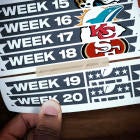The Le'Veon Bell saga has taken some unexpected turns. The assumption was Bell would sign his $14.544 million franchise tender around Labor Day, like last year, so he could be ready to play in the season opener against the Browns. When it became apparent that Bell wouldn't, some of his teammates vented their frustration by publicly criticizing him.
Bell remains unsigned without any known timetable for him to play football this season. He is forgoing 1/17th -- or $855,529 -- of his franchise tender, which has been counting against Pittsburgh's salary cap since he received the designation, with each week he misses. The Steelers get a salary-cap credit in that amount for every week he isn't under contract, in addition to saving money. The total will be just under $3.425 million after the Week 4 games.
There's a new twist. Bell's relationship with the Steelers is seemingly starting to reach a point of no return. ESPN's Adam Schefter reported on Sunday that Pittsburgh is listening to trade offers for the three-time All-Pro running back. Bell can be dealt to another team until the 2018 season trading deadline at 4 p.m. ET on Oct. 30. There are multiple variables that must fall into place for a deal to take place.
Bell's contractual status
Players with unsigned tenders can't be traded until signed. I dealt with this particular aspect of Bell's situation while an agent. One of the players I helped represent was cornerback Jimmy Hitchcock. The Patriots informed us during the 1998 NFL Draft, after they used a first-round pick to select Tebucky Jones, a safety who would be moved to cornerback, that a trade with the Ravens had been worked out for Hitchcock. Since Hitchcock didn't want to be dealt to a team that drafted a cornerback in the first round, we advised him to refuse to sign his restricted free-agent tender. His refusal killed the trade. Hitchcock subsequently signed his tender for a trade to the Vikings, who hadn't used a high draft choice on a cornerback. Essentially, Bell has a de facto no-trade clause or veto power of a trade.
By CBA rule, franchise players who don't sign long term by the mid-July deadline are prohibited from signing a multi-year contract until after the 2018 regular season, which ends on Dec. 30. This prohibition on signing a long-term deal also applies to any team acquiring Bell in a trade.
Desperately wish you had a 30-minutes-or-so, daily NFL podcast in your podcast app every morning by 6 a.m.? Put some Pick Six Podcast in your life and join Will Brinson as he breaks down the latest news and notes from around the league, as well as the win totals on a team-by-team schedule. It's a daily dose of football to get you right for that commute or gym trip. Subscribe: via iTunes | via Stitcher | via TuneIn | via Google Play
Bell isn't restricted to just playing for his franchise tender with Steelers or an acquiring team. He is allowed to negotiate his one-year salary and other conditions relating to his franchise-player status.
It is customary for franchise players who don't get long-term deals to play for the tender amount. Giants defensive end Jason Pierre-Paul signed an incentive laden one-year deal in 2015 worth up to the prorated amount of his franchise tag after severely injuring his right hand during a Fourth of July fireworks accident, which kept him from being physically cleared to play football until seven weeks into the season.
Bell getting more than his tender amount would be unprecedented but could help expedite his return to the football field. A few franchise players have been able to negotiate a clause preventing a franchise or transition designation for the following year to ensure unrestricted free agency. It hasn't happened in a decade. It might be necessary for the Steelers to grant permission to a team seriously interested in acquiring Bell to discuss these items with Adisa Bakari, his agent, prior to finalizing a trade.
The acquiring team could designate Bell as transition or franchise player, which would be his third designation, in 2019. A player can be franchised only three times during his career. The procedures outlined in the CBA dictate that Bell's third tag will be the greater of 144 percent of his second franchise designation or the largest number at any position, which is almost always quarterback, provided he plays football this season. Assuming the 2019 salary cap is in the $190 million neighborhood, the quarterback number should be approximately $25 million.
The transition tag becomes a more viable option the longer he waits to resume playing football. The number would be the greater of 120 percent of Bell's prior-year salary or the sum of the transition numbers at running back (average of 10 largest salaries annually) over the last five years divided by the cumulative salary caps for the same period where the resulting percentage is multiplied by the current year's salary cap (known as Cap Percentage Average). Bell's prior-year salary would be the actual amount he earns this season. For example, if Bell returned to play for the prorated amount of his franchise tender after being dealt at the trading deadline, his 2019 transition tag would be Cap Percentage Average number, which should be around $10.25 million assuming a $190 million salary cap next year, since $9,239,718 would be 120 percent of what he made this season.
The CBA also expressly prohibits any discussions about a new contract or any type of agreement in principle now that would go into effect after the regular season ends. The acquiring team would have Bell's exclusive negotiating rights from the end of the regular season until March 11, when what is referred to as the legalized tampering period before free agency begins absent the use of a designation.
The penalties would be an effective deterrent from violating the rules. Bakari and Bell would be subject to a fine up to $500,000. Commissioner Roger Goodell could impose a fine for as much as $6.5 million on the team where up to two first-round picks could also be forfeited. The team employees involved could be facing a year suspension and would have the same financial exposure as Bakari and Bell.
Trade compensation
The inability to execute a sign and trade, like the Bears recently did with All-Pro defensive end/linebacker Khalil Mack, complicates matters. The days of teams receiving a huge bounty for a running back in a trade are long gone anyway. There's been only one running back traded in recent years for a first-round pick: Trent Richardson. The Browns received a 2014 first round pick (26th overall) from the Colts for Richardson, the 2012 third-overall pick, early in the 2013 season. Richardson was 23 years old and considered as a potential workhorse running back when dealt. He was a big disappointment, and hasn't played in the NFL since the 2014 season.
Bell won't be the second. The potential of Bell being a rental for only several games despite the ability to use a franchise or transition designation on him in 2019 will limit the draft compensation Pittsburgh can get in return.
The Steelers should reasonably expect a third-round pick at the most for Bell. That's what Pittsburgh would hope to get in 2020 as a compensatory draft pick for Bell signing with another team in free agency next offseason. The third-round compensatory pick wouldn't be a certainty because Pittsburgh would need a big enough net loss of players through 2019 free agency with Bell getting a significant contract. The top of the running back market is currently set by Todd Gurley's four-year extension with the Rams averaging $14.375 million per year and containing $45 million on guarantees.
Bell rejected a five-year deal reportedly in the $14 million to $15 million per year range with a $10 million signing bonus prior the mid-July franchise player signing deadline. Slightly over $33 million of the money was in the first two years. The three-year cash flow was $45 million. Bell's contract demands would also factor into the type of compensation a team would be willing to give up in a trade.
Trade logistics
A team must have enough salary-cap room to absorb a player's current salary in order to trade for him. Assuming a trade could be made after the Week 4 games, the acquiring team would need just under $11.125 million to accommodate 13/17ths of Bell's franchise tender. Only a handful of teams -- including the Jets, who have reportedly had a preliminary conversation with the Steelers about Bell -- are capable of doing so.
The following teams currently have enough cap room to acquire Bell according to NFLPA data. Obviously, teams could create cap room by restructuring contracts in order to be in a position to handle the remainder of his franchise tender.
TEAM SALARY-CAP ROOM
Browns: $58.04 million
Colts: $51.71 million
49ers: $37.17 million
Texans: $26.009 million
Titans: $21.903 million
Jaguars: $14.63 million
Jets: $16.14 million
Cowboys: $12.78 million
A contending team with the requisite cap room that thinks Bell could be the missing piece for a Super Bowl run makes the most sense. None of the teams fit the bill.
Every week that passes until the Oct. 30 trading deadline reduces the cost for the team by $855,529. Since approximately $7.7 million of cap space would be necessary at the deadline, running back needy teams like the Buccaneers and Packers, who currently are $7.93 million and $7.89 million under the cap respectively, could come into play.
A lack of guaranteed money in Pittsburgh's offer was problematic for Bell. Since Green Bay structures veteran contracts like Pittsburgh does, except with quarterback Aaron Rodgers, the same issue would likely exist with the Packers and make a trade, which Bell could essentially reject, unappealing to him. The defending Super Bowl champion Eagles, who have $4.29 million of cap space, are a Fletcher Cox ($17.9 million cap number) contract restructuring away from being in a similar cap position.
Final thoughts
There are likely too many obstacles for Bell to be dealt unless Pittsburgh is willing to accept a lot less than reasonably expected just to turn the page. Mainly, the inability to discern whether he is signable long-term is likely the biggest stumbling block because the multi-year contract prohibition currently in place even prevents a discussion about contract parameters prior to a trade.
The dynamics of the situation give Bell plenty of incentive to return at some point before 4 p.m. Nov. 13 in Week 11, by which he must sign in order to play this season. Bell would be practically assured of free agency in 2019 without having the heavy usage season with over 400 touches (combined rushing attempts and receptions) that he and his agent are concerned could impact him on the open market.
A third franchise tag at approximately $25 million would be too cost prohibitive. Although a transition tag would be affordable, it would be surprising given the acrimony between Bell and the Steelers. Unlike the non-exclusive franchise tag, a transition designation would provide the Steelers only a right to match an offer sheet from another team. Pittsburgh would be vulnerable to an offer sheet with a structure that isn't consistent with their other contracts. There wouldn't be any draft choice compensation, if matching rights weren't exercised.





















